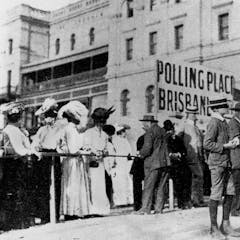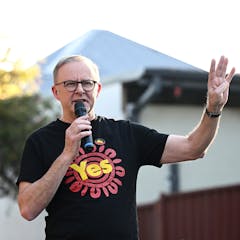
Articles on Voice to Parliament referendum
Displaying 1 - 20 of 63 articles

Governor-general designate Sam Mostyn would become the latest punching bag in the culture wars. But how will her Governor-Generalship compare to others past?

The latest Closing the Gap report reveals just four of the 19 targets are on track to be achieved. It comes after years of failing to give First Nations people a say over their own lives.

Despite the best of intentions, the prime minister’s determination to take Australians to a referendum on the Voice to Parliament has caused tremendous damage.

The idea of equality is not what it used to be -–and it’s a political headache for Labor.

The “he said/she said” reporting of yesteryear no longer serves a democratic purpose. Media must do better at calling out lies and misinformation.

The vote demonstrated that the project of progressive politics in Australia remains brittle.

After a bitterly fought campaign, Australians have voted against an Aboriginal and Torres Strait Islander Voice to Parliament by a clear majority.

The latest results for the Voice to Parliament Referendum are showing a “no” majority nationally and among the states.

The decline in support for the Voice after initial strong polling demonstrates settlers are resistant to the idea of Indigenous peoples as a collective subject entitled to a unified Voice.

For decades, women from Munich to Melbourne, from Westminster to Washington, had been campaigning for a voice.

The PM also reconfirmed that if there is a no vote he will not seek to legislate a Voice

Exclusive polling shows that those who see Australia as a divided nation are far more likely to vote “no” than those who see it as united.

A ‘no’ result in the vote could compromise Australia’s moral authority when it seeks to advocate or pressure other states on human rights issues.

Despite the claim ‘there is no comparable constitutional body like this anywhere in the world’ many countries have similar institutions to the proposed Voice.

One interviewee told us: ‘Today our lives are being governed by a bureaucrat who hasn’t seen a Blackfella in their life or haven’t spoken to one.’

It is notoriously difficult for referendums to succeed in Australia – but there are lessons from those that have gone before about how to improve their chances.

From a legal standpoint, there is a difference between a state and a territory, and for some that justifies giving territory voters less say over changes to the national constitution.

While most repeat referendums fail, it is possible to succeed if the referendum proposal is altered or untethered from an unpopular element.

The ‘no’ side is successfully engaging young people on TikTok by combining volume (posting multiple TikToks a day) with authenticity, use of personal narratives and humour.

Unfortunately we’re a bit out of practice in how to conduct ourselves in a referendum. These seven rules may help.
